
|
|
Abstract: An interview with Ita, one of the earliest participants in the Sandinista Revolution in Nicaragua that resulted in the removal of Anastasio Somoza from power in 1979. Includes letter about the organization "Quest for Peace." Notes: |
Ita and the Sandinista Revolution
by Robert G. Wilson
published in dialogue, 1:4, pages 27-30Los Angeles: 1987
Ita: I was in high school in Managua in 1972. At that time the Somoza government was very oppressive, especially toward the poor and women. I did not want to be a woman of no value. I felt I was different. I believed that women should have the same rights as men. This was an unpopular stance to take in a male dominated society. I knew that the first step I should take to free women from oppression was to change the government, to ultimately change the system.
dialogue: Were there other factors that got you involved in the revolution?
Ita: I was very determined, very outspoken in school. I also despised the injustices that were being done. There was too much poverty in my country, and no one did anything about it. Also, there was a dictatorial class system. If you had the proper last name, if you were related to those in power, you had everything. If you were poor you would always remain poor, even though you worked 12 hours a day. Work, effort, and an honest life did not bring any benefits to the poor.
dialogue: How did you get involved with the Sandinistas?
Ita: It began, I suppose, when I began to talk with students who had views similar to mine. A lot of people felt like I did, although no one knew what to do about it.
dialogue: Were there Sandinistas in your high school?
Ita: Yes. I was outspoken and respected by the students. I began to organize protests. Then I began writing pamphlets. There were also contacts in the school, organizers. I became one of the organizers. My job was to explain to the students what the protest was about. I also wrote a bulletin about when and where the protests were held.
dialogue: How did you become an organizer?
Ita: Fernando Cadera was one of the students in my class. Later he became important in the revolution. I sought him out, and I sought out a few others who were devoted to establishing a new system. He had many contacts in the school, including a few teachers.
dialogue: Weren’t you afraid of being arrested?
Ita: Yes! One day the school administrator called me into his office and chastised me. He suspended me from school for two weeks because of my anti-Somoza activities. I got mad at him and told him we must say what we feel, that people are suffering and starving in our country and that we must make a change. I told him there is no freedom in Nicaragua and that we all had to do something to bring about change. But he suspended me anyway. It was then I learned how many friends I had. The students cried out for my reinstatement and protested my removal from school.
dialogue: How organized were the Sandinistas?
Ita: I was a member of FER, “Frente Estudiantil Revolucionario.” This was the high school organization of the Sandinistas. We each had our job to do.
dialogue: What were the other revolutionaries like?
Ita: They were wonderful: devoted and idealistic. They were determined, positive, and they had faith that the revolution would succeed. Many of the leaders were intellectuals and many were very politically astute. Some of those who assisted us were from Cuba. Others were from the professional classes, like doctors, attorneys, educators.
What struck me most about the early leaders of the revolution is how unselfish they were. We would visit in each others’ homes and everyone would listen when others spoke. Being a woman and a high school student, I was not used to speaking out, but one of our goals was equality of the sexes. I spoke out and everyone listened. I was treated as an equal, which was rare in the macho dominated society of that time.
dialogue: What happened when you returned to school after your suspension?
Ita: Shortly after I returned to school the earthquake of 1972 hit. The city of Managua was devastated. The earthquake changed everything. All organizations were suspended. It was a sad time.
I did almost nothing after the earthquake. I returned to school. Our only thought was to rebuild. I learned during that hard time that there were more important things than material considerations. I saw the spirit of the people at work. I almost lost my life in the earthquake when our house collapsed around me. I was led to safety by our maid, through a hole in the wall.
dialogue: How did you make contact with the Sandinistas again?
Ita: I graduated from high school in 1974 and went to the University of Managua. I was a student and I also had a good job as an assistant to the treasurer of the university. I met revolutionaries in school and continued my work with them. They were wonderful people, very devoted to helping the poor and always talking about the suffering of our nation and planning how we could bring about change. We had many slogans then. We talked about how the rich people must go down and the poor people come up. We said that we had no money, but we had spirit. We had no military, but we had hope. We did not doubt that we would succeed. Our goal was to establish freedom in Nicaragua and build a new socialist country.
dialogue: Did you go along with the Sandinista plan?
Ita: Yes. It was very exciting. I was an organizer and I was treated with respect. I attended meetings with the leaders of the revolution. It was during this time in the revolution that we made a big mistake. We surmised that since the United States supported Somoza, that we did not want Americans in Nicaragua. Therefore we made banners and painted “Yankee Go Home” on the walls of buildings. I say this was a mistake because we learned later that the American people and the American government are different. The United States’ administration oppresses other countries, but the people of the United States are kind and generous. By not knowing this, we alienated many potential supporters.
dialogue: Were you a Communist?
Ita: We insisted that we were not Marxists, that we were Sandinistas. Daniel Ortega and Tomas Gorge were from poor backgrounds. They were very sensitive and they knew the political situation. We wanted Nicaragua to have its own destiny, without affiliation to Cuba, the Soviet Union, or anyone else.
dialogue: During this time, how did you help the revolution?
Ita: I wrote articles for the Sandinistas. I wrote how we must become united and how we must have conciente, social conscience. I did not write against Somoza. Everyone knew how bad Somoza was. I wrote about justice, bringing people together, helping the poor and the workers, and what we could do as a unified people to topple this corrupt government.
This was a good time for me. I was working with wonderful people. I was the only woman in the party in those early days and the men treated me with respect. This fulfilled my belief in the equality of men and women. It showed we were united. This Sandinista experience added to my love for my country. With my whole heart I wanted to help. And we were helping each other. We shared food, clothes, automobiles—everything.
It was during this time (late 1977, early 1978) that our influence grew and the opposition from the government increased. I quit my job at the university and took a job with an international exporter of coffee. I was still in the revolution, but my fellow workers did not know it. I attended parties and meetings with the leading Nicaragua families and I reported their activities to the Sandinistas. I was, in other words, a spy. It was dangerous and exciting work. I enjoyed it.
dialogue: Did you participate in any of the confrontations of the revolution?
Ita: There were often clashes between demonstrators and police. One of the biggest battles I was in occurred in Masaya, my village and where I lived while I worked as an exporter. The people in Masaya were mostly poor and they were Indians. They had been mercilessly harassed by Somoza’s police. In February 1978 they arose against the dictator with .22s, machetes, Molotov cocktails, knives and simple tools. Somoza responded with “Operación Limpieza,” the clean-up operation. The guardia came into Masaya and began shooting people. It was terrible. They shot indiscriminately. They killed anyone who was suspicious. They did not even knock on the doors of the houses. They shot women, children, teen-age boys and old men. They killed many, many people.
During this fierce battle, I was telling people what to do. I had a political meeting in my house in Masaya. The Sandinistas were careful coming there. They slipped in one by one. We called our revolutionary fighters muchachos, the boys. Everyone was very courageous, very devoted and heroic. Shortly after the Masaya uprising there was fighting in Managua. Many died. The guardia began policing Masaya and the rights of the people were completely removed.
dialogue: What did you do then?
Ita: It was a perilous time for me. I had a boyfriend who I grew up with, and I was seven months pregnant when this was taking place. I did not want to marry him. He was from an upper-class family and he had no social consciousness, I knew that if I married him I would end up as his woman and not as an equal. He disapproved of my involvement with the Sandinistas.
Some friends arranged for me to flee to San Jose, Costa Rica. My child was born there. While I was in Costa Rica I missed my Nicaraguan friends who were so valiantly working for the revolution. One friend who helped me at that time was a Brazilian medical doctor. He had come to participate in the revolution. He was a very devoted communist. He loved the poor. He was devoting his life to the betterment of the oppressed. Although he loved me and wanted to marry me, I did not want to marry him. We had disagreements. For example, he did not believe in God and he spoke about religion just like many Sandinistas did. He would tell the people that there is no God and that they had to help themselves. He would say, “Do you think Jesus did good? Look at us! Look at what has happened to us! The system of Jesus brought this war, depression, poverty, injustice, and terror from fellow Christians! Our cause is godless and it is right!”
I believed in God and I did not think that religion had to enslave people.
dialogue: How long did you stay in Costa Rica?
Ita: I arrived in Costa Rica in September 1978. In early 1979 I returned to Nicaragua.
dialogue: What was happening in Nicaragua when you returned?
Ita: Things had already changed. There was terrible and cruel repression. Everyone was suspect. Police were everywhere and there was incredible tension. When I look back on it now, it may have been a mistake for me to return. I left my son with my sister in Managua and returned to Masaya, with the Brazilian doctor, to help with the revolution. This was just before the victory. This was just before all my friends were killed.
dialogue: What happened?
Ita: One day the Brazilian doctor told me that Somoza’s army was coming, with aircraft and battalions, and that we must all flee. I had been working all morning in the hospital, assisting the medical staff. I told my Brazilian friend that I would meet him and the others at a certain place but that I wanted to go home and take a shower first. I did not think the attack would happen so soon. When I was at home the army attacked.
It was terrible. Airplanes strafed the streets. Houses were blown apart and people were indiscriminately killed. One wall of my house was destroyed. Fires raged. The army went through the streets, shooting people. I hid in my damaged building, fearful, listening to distant screams and gunfire, wondering what had happened to my companions.
When the fighting was over, Masaya was in ruins. The famous market in Masaya was completely destroyed. Bodies were everywhere. One of my sisters came to find me. She told me that the medical staff from the hospital were all dead, including the Brazilian doctor.
My friends from the hospital had been captured by the army. They had been tortured. Acid had been poured on their skin to make them talk about the Sandinista organization and sympathizers. Many had their heads crushed, including my Brazilian friend. Their bodies covered a small town square.
There was no one to bury them. I got a shovel and some of the villagers began helping me. Together we dug a large common grave and put the bodies of the hospital staff into it, including the mutilated body of my friend. I worked until I was exhausted and then I collapsed. I was taken to a hospital where I stayed for two weeks. It was during my stay in the hospital, in June of 1979, that we had the Sandinista victory.
dialogue: After the victory, what did you do?
Ita: My son was living with his father. I had no close friends left—they had all been killed. I was heartbroken and saddened by the bloodshed and all the people who had died. I was able to get my old job back, so I went to work.
dialogue: Did you keep in contact with the Sandinista leadership?
Ita: No. I did not want to. I did not want a part in the new government. I was happy that we had won, that the dictator was ousted. It was at this time that I encountered the Bahá'í Faith.
dialogue: How did you hear about the Bahá'í Faith?
Ita: I was on a holiday. I went to visit my sister in Managua. She was going on an outing with some Bahá'ís. I asker her what this was, and she told me a little about it. At the time I did not want to meet any new people. I was still very sad. My sister insisted, however, and I joined her on the picnic.
I met the Bahá'ís and their friends. They were very loving toward me and did not seem shocked by my past adventures. They were very sympathetic toward everyone who had suffered during the war. The Bahá'ís slowly began to introduce me to the Bahá'í teachings. In the weeks that followed, I studied and learned more about this new religion. The principles, such as the equality of women and men, universal education, the establishment of justice, these were the principles I had risked my life for. Now they were stated so clearly, and it was also stated in the Bahá'í teachings how they could be achieved. Not through revolution, but through social evolution; through living these principles in our lives and speaking about them to others.
I joined the Bahá'í Faith and I continue to teach this powerful, important, and world-encompassing religion. I only wish my old friends could have heard about it.
dialogue: What problems, in your opinion, does Nicaragua face in the future?
Ita: There are many serious problems. The most pressing is the economy. All finances go into military build-up in Nicaragua, and there is little left for the people. It is a state of emergency. There is no food, no material necessities, or entertainment, and all freedom has been curtailed.
Military aid to the contras will only push the Nicaraguan government toward the communist aligned nations. Already Cuba and the Soviet Union help Nicaragua because the United States will not help them. The people of Nicaragua like the United States, and they do not understand why the United States government is so cruel toward them. The United States must be friendly, patient, understanding, tolerant, and respect the Nicaraguans. They must show the people of Nicaragua that we are their neighbour and their friend. The Sandinistas are not stupid. They cannot be put down with words and threats. They are intelligent people and will do what they can to preserve their country. Support of the contras will only result in many dead. It will bring hunger and suffering to the people and turn them against the United States.
Robert Wilson lived in Nicaragua from 1968 to 1971 and currently resides in Atlanta, Georgia where he works as a managing consultant. He is a former secretary of the American Bahá'í National Teaching Center and the author of Pentacles of Dawn, a science fiction novel. Ita is the nickname of the young Nicaraguan Bahá'í interviewed. She is now married and living in South America.
Letter to the editor: "Contra Aid," published in dialogue 1:2 p. 5-6
We have visited Nicaragua many times since 1983. Over and over again, the poor of that land left us with this message:“We know that the people of the United States are not the same as the government. We know you do not support Reagan’s policy of aid to the contras. Please tell your people that we too want to live in friendship and raise our children in peace.”
In spite of the fact that 2/3 of the U.S. people in recent polls oppose aid to the “contras” who are attacking Nicaragua, the House of Representatives recently approved $100 million in military and logistical support as requested by President Reagan. They approved a policy that literally “cries to heaven for vengeance.”
We recently celebrated our independence as a nation. And yet our foreign policy seeks to snuff out the independence of the Nicaraguan people who yearn for what we say we cherish: the right to determine one’s own destiny as a free people. Aid to the “contras” threatens Nicaragua’s efforts at land reform, universal education, and universal health care before they become a contagious example for other down-trodden people in Latin America.
Our CIA has armed 10,000 “contras,” led by violent survivors of Somoza’s National Guard, to attack rural Nicaraguan hamlets. Their human rights violations — rape, torture, pillage and murder — are many and well-documented. This violence, joined with the U.S. economic embargo, threatens to crush Nicaragua.
President Reagan’s descriptions of Nicaragua simply do not reflect the reality in that country.…We know because we have visited Nicaragua several times. U.S. policies have made us an international outlaw, fleeing decisions of the World Court whose work we had previously hailed. Nicaragua grows ever more likely as a place of body bags for U.S. young people.
You can act to change this situation.
Join us in the Quest for Peace, a campaign of true humanitarian aid for the people of Nicaragua. In December 1985, we pledged to match with humanitarian aid the $27 million appropriated by the Congress for the “contras” last year. As of June 1986, that goal has been reached — thanks to the grassroots efforts of thousand of people across our land.
As the Administration sought to increase Nicaraguan blood-letting with $100 million in “contra aid,” we pledged to
We invite you to join us in this Quest for Peace. In two years of sending aid from North American people of faith to people of faith in Nicaragua,
Will you join us? Write or send your tax-deductible contributions to:
Quest for Peace
P.O. Box 5206
Hyattsville, MD 20782William R. Callahan, SJ and Maureen Fiedler, SL
Co-Directors, Quixote Center (which coordinates the “Quest for Peace”)
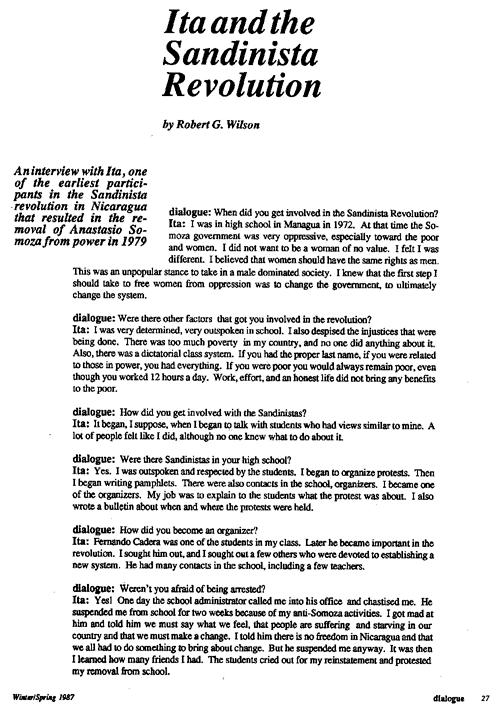
click for larger image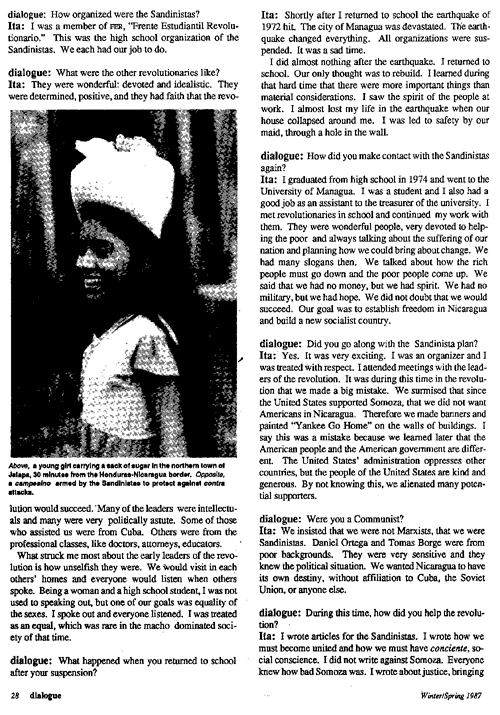
click for larger image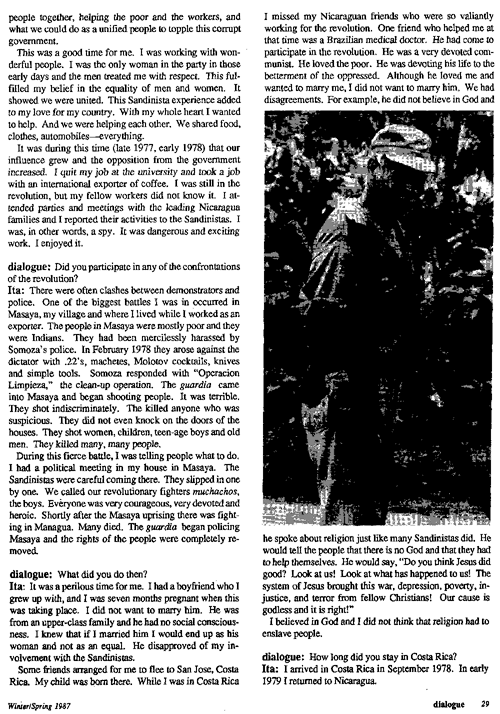
click for larger image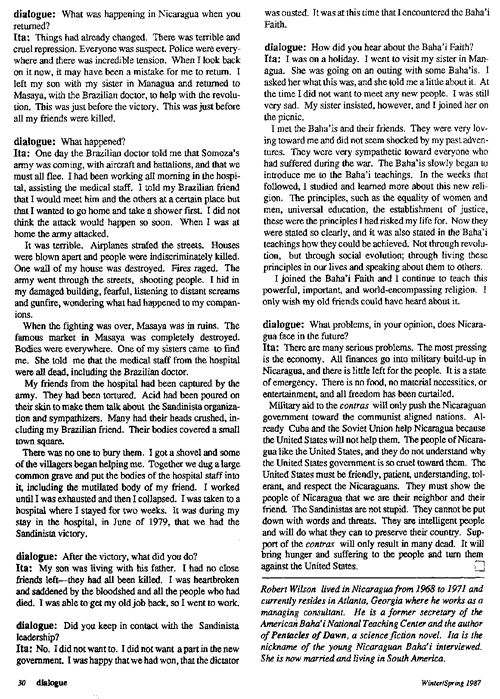
click for larger image
Letter to the editor: "Contra Aid," published in dialogue 1:2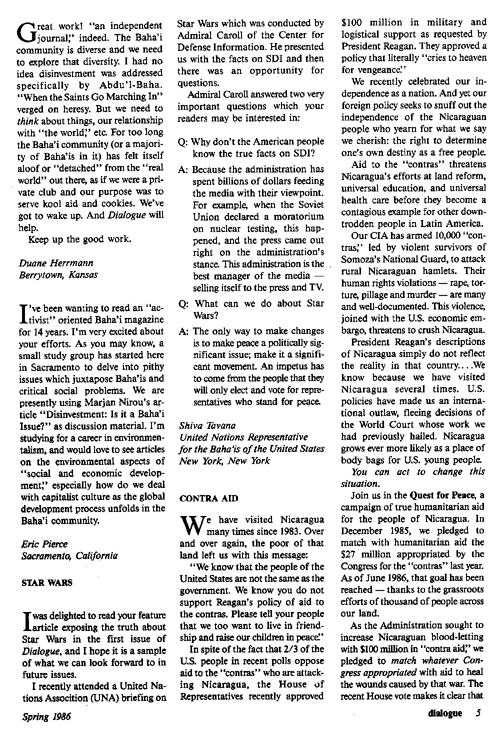
click for larger image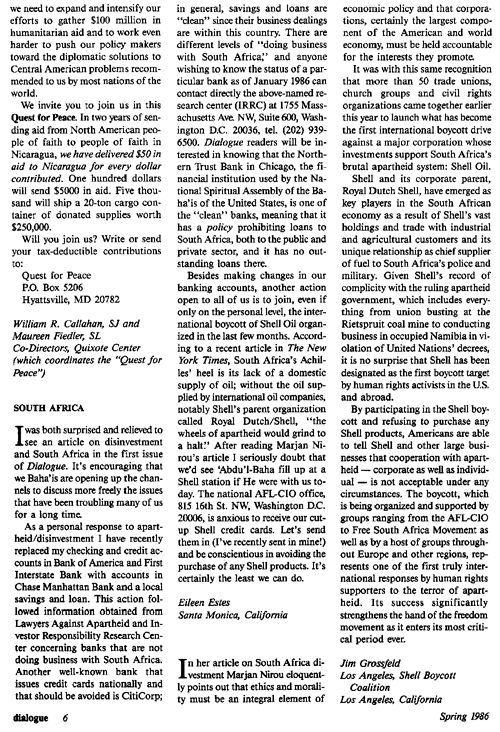
click for larger image
|
|